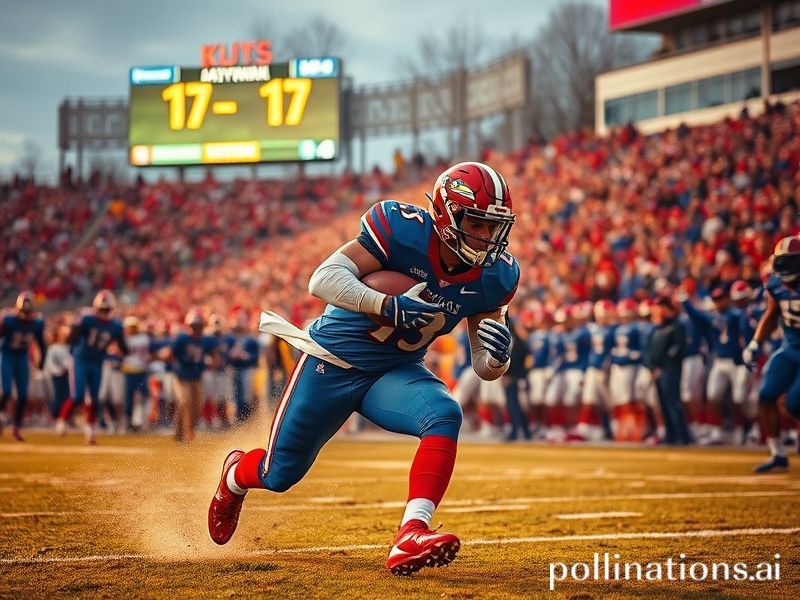Kansas Football: The Glorious Global Failure Nobody Asked For
Kansas Football and the Art of Cosmic Insignificance
by Special Correspondent Luka Petrovic, filing from a hotel bar that still thinks Prohibition is negotiable
Somewhere on the vast, wheat-swept oblong Americans call “the Heartland,” 53 scholarship athletes in crimson and blue keep losing football games with the dependable rhythm of a Swiss cuckoo clock that’s been dropped in a canal. To the average European, this is roughly as geopolitically urgent as a Moldovan curling scandal, yet Kansas Jayhawks football has quietly become a trans-continental allegory for the late-industrial condition: a multibillion-dollar industry whose marquee product doesn’t actually work.
The numbers are almost adorable. One conference victory since 2014. A home-stadium turnstile count that could fit inside a mid-tier Bundesliga fan park, plus parking. And still, the university pays its head coach more annually than the GDP of Tuvalu. Somewhere in Brussels, a Eurocrat balancing Portugal’s debt ledger is staring at that salary figure the way medieval peasants once stared at comets: a sign that God has either a sense of irony or a drinking problem.
Globally, the Jayhawks’ ineptitude is instructive. In an era when every scrap of human endeavor—from Maldivian coral reefs to Siberian permafrost—comes pre-packaged with analytics and KPIs, Kansas football offers the refreshing counter-lesson that you can, in fact, spend lavishly on something for decades and still finish below Kansas State, a land-grant college whose agricultural research wing has literally produced heartier turkeys. There is comfort in that. If the planet is going to burn, at least we can watch it burn symmetrically.
Consider the soft-power ramifications. The Chinese Super League once lured Oscar from Chelsea for €60 million, reasoning that prestige on grass equals prestige on the global stage. Meanwhile, Kansas can’t lure a four-star recruit out of suburban Dallas even with the promise of free BBQ and a communications degree that’s easier than Twitter. The takeaway for foreign ministries: if you want to project strength, maybe buy missiles instead of midfielders—or in Kansas’ case, buy the missiles and still schedule a body-bag game against Coastal Carolina.
The merchandising arm tells its own tragicomic tale. Alibaba lists “Kansas Football—Fighting Jayhawks” hoodies for $11.37, shipping included. The reviews are a museum of diaspora melancholy: “Runs large, like their defense,” writes ChenWei_88 from Shenzhen. “Arrived faster than their offense,” adds Priya from Mumbai. Somewhere in an Amazon warehouse, a pallet of unsold 2021 conference-champion T-shirts gathers dust alongside surplus “Boris Johnson: Full Term” mugs—relics of futures that never arrived.
Yet the program persists, zombie-like, nourished by television contracts so bloated they’d make FIFA blush. ESPN needs inventory on Thursday nights; Kansas provides the football equivalent of dead air, and everyone pockets the rights fees like oligarchs splitting a pipeline. In that sense, the Jayhawks are the Nord Stream 2 of college sports: expensive, leaky, and impossible to shut off without angering Germans—or in this case, Kansas boosters who still think a 1995 Aloha Bowl win is “recent.”
What does it mean for the wider world? Simply this: if a society can rationalize paying $5 million a year to go 2-10, it can rationalize anything—subprime mortgages, Brexit, leaving the Paris Accords because it might snow in April. Kansas football is not a failure; it is a mirror. The rest of us just aren’t honest enough to put our own losing streaks on national television every Saturday.
And so the band plays, the small crowd files out into the prairie night, and somewhere a freshman linebacker updates his LinkedIn to “open to work.” The stadium lights dim, but the cosmic joke remains brilliantly lit. In the end, we are all Kansas football: overfunded, underperforming, and stubbornly convinced next year is our year.
Until it isn’t. Again.







